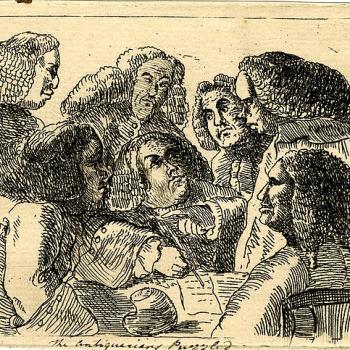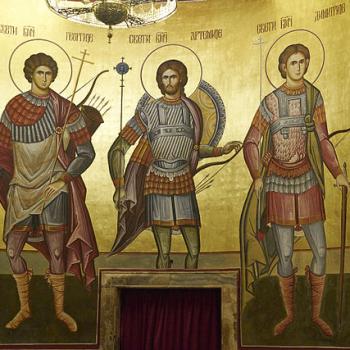
It doesn’t seem to be true at first glance, but the words provision and providence mean exactly the same thing etymologically. The prefix pro-, a variant of pre-, means, of course, “before” or “preceding”; while both -vision and -vidence derive from the Latin video, meaning “I see”. Therefore, both provision and providence signify a kind of “foreseeing” or a “seeing something before” the events that follow after.
But we know well enough that the definitions of these words differ greatly. Their meanings show us how root morphemes can wander off in different directions, even when they are yoked together. Provision refers to the act of providing or supplying with, while providence most commonly is a way of describing the “behind-the-scenes” machinations of God or gods or fate. The common factor in both terms is the idea of something coming into existence – or within one’s power of apprehension – that wasn’t there before.
Those of us who profess and believe in the God of the Judeo-Christian Scriptures are apt to be familiar with these spiritually important words. We pray and ask God for the provisions of our daily life (“Give us this day our daily bread”), and we talk to Him about how we would like Him to intervene in our lives (“Lead us not into temptation, but deliver us from evil”). The second of the two terms, providence, is naturally the more complex and elaborate one, and involves a sophisticated view of temporal matters. “Providence” implies that an Intelligence is at work – much like a weaver or tapestry artist – interlayering and intermingling varied strands of occurrences, so that the historical end result is what the Intelligence had in mind. And when I say “end result”, we believers understand that there is no such thing – that is, no such thing until the Final Act of All History. We know that any point in time before that is, by definition, temporary, fleeting, and provisional.
Provisional. There are those two units of meaning fused together again: pro and vision. But what are they doing in this particular word – a word meaning conditional or contingent? Well, in the fifteenth century the French added a shade of meaning to provision that had been missing before: a shade of meaning that included the idea that some things are provided only for temporary or situational or immediately present needs. Their word was provisionnal, which eventually got adapted into English with the definition we’re considering here. The interesting question, to my mind, is this: when we talk about God’s providence, are we thinking in terms of our present – or permanent – requirements?
Psalm 104 describes beautifully how God provides all our earthly needs, and even the grass for the cattle, and “the crags as a refuge for the hyrax”. All of which answers temporal needs. That may be God’s provision, but what of His providence? Where do we see Him orchestrating events at the crossroads of history? Jesus tells us that not a single sparrow falls to the ground “without your Father’s consent” (CSB). Now that would suggest His incredibly close involvement in every conceivable activity.
But then we read in Acts where Paul tells a group of pagans that ”in past generations he (God) allowed all the nations to walk in their own ways”, though even then He graciously provided rains and fruitful seasons. Presumably those heathens were walking in their own ways “not without the Father’s consent”. Was He simply allowing those pagan nations to do what they wanted to, or was He choreographing their self-willed actions toward a denouement He had in mind all along?
Undoubtedly both, of course. He has a way of making sure our willful acts serve His preplanned strategies. We are rats in a maze with many optional routes, but all of those passageways lead to an End Point beyond all our poor powers of foreseeing. After all, isn’t that a good working definition of providence itself: choreographing the apparently self-determined into a “happy ending” unforeseen by the actors themselves? And, if true, that would teach us very convincingly that the provisions of the Father are both provisional and providential, and that His providing is simultaneously eternal (outside the realm of time) and sempiternal (endless within the scope of our earthly lives). And that would be a beautiful lesson to learn.

















